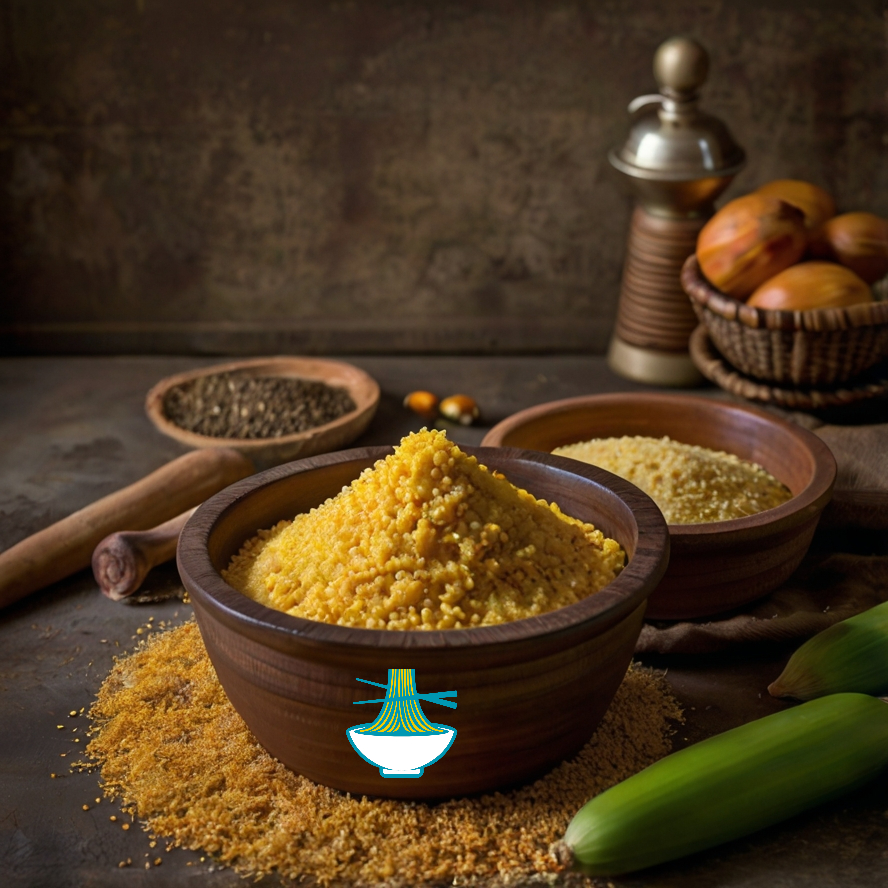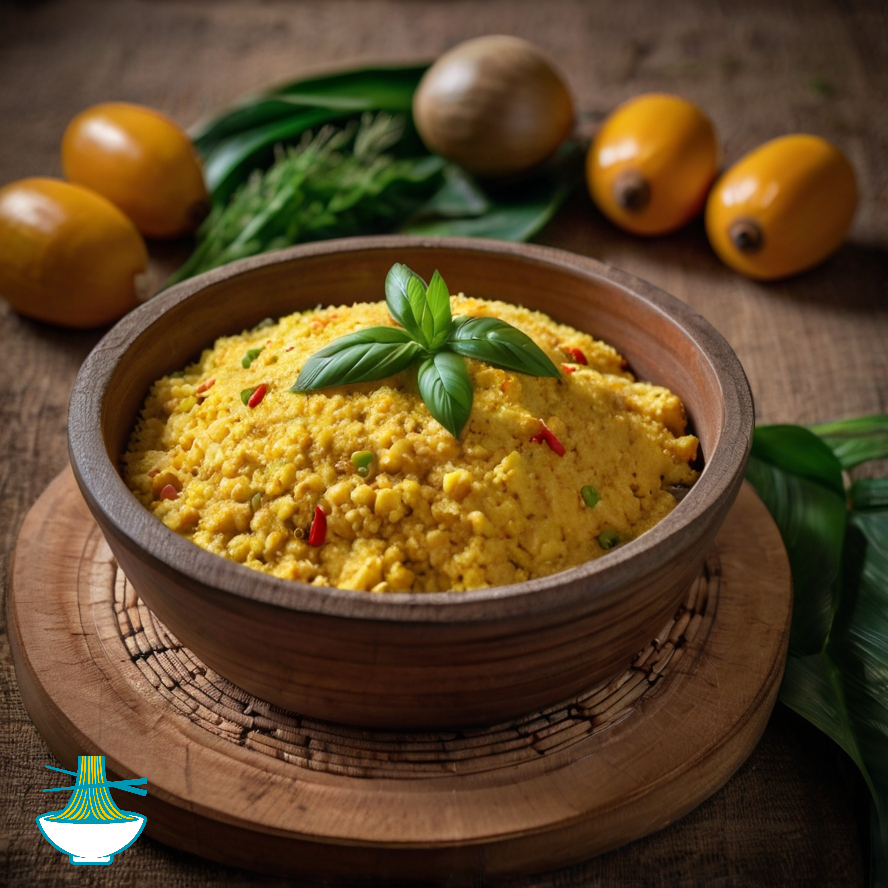Discover how to make Tô, a beloved staple dish from West Africa. This recipe features millet or maize flour, creating a hearty and versatile base that pairs perfectly with a rich, spicy sauce. Ideal for those exploring traditional African cuisine, Tô is both nutritious and satisfying. Follow our step-by-step guide to create this flavorful dish at home.
Ingredients:
- For the Tô:
- 1 cup millet flour or maize flour
- 2 cups water
- 1/2 teaspoon salt
- For the Spicy Sauce:
- 2 tablespoons vegetable oil
- 1 onion, finely chopped
- 2 cloves garlic, minced
- 1-2 fresh chili peppers, chopped (adjust to taste)
- 1 cup tomato puree
- 1 tablespoon tomato paste
- 1 teaspoon paprika
- 1 teaspoon ground cumin
- 1 teaspoon ground coriander
- 1/2 teaspoon salt
- 1/2 teaspoon black pepper
- 1/2 cup water
- Optional: 1 cup cooked meat or vegetables for added flavor
Instructions:
Prepare the Tô:
- In a saucepan, bring 2 cups of water to a boil. Add the salt.
- Gradually add the millet or maize flour to the boiling water, stirring continuously to avoid lumps.
- Reduce heat to low, cover, and simmer for about 10-15 minutes, stirring occasionally until the mixture thickens and becomes smooth.
- Once cooked, remove from heat and let it cool slightly before serving.
Prepare the Spicy Sauce:
- Heat vegetable oil in a pan over medium heat. Add the chopped onion and cook until translucent.
- Add the minced garlic and chopped chili peppers, and cook for another 1-2 minutes.
- Stir in the tomato puree, tomato paste, paprika, ground cumin, ground coriander, salt, and black pepper.
- Add 1/2 cup of water to the sauce and simmer for 10 minutes, stirring occasionally.
- If desired, add cooked meat or vegetables to the sauce and heat through.
Serve:
- Spoon the Tô onto plates or bowls and top with the spicy sauce.
- Enjoy warm as a satisfying meal.
Nutritional Values
For the Tô:
Millet Flour or Maize Flour:
Millet Flour:
- Calories: 378
- Carbohydrates: 73 grams
- Protein: 11 grams
- Fat: 4.2 grams
- Fiber: 8.5 grams
- Vitamin C: 0 mg
- Potassium: 280 mg
- Magnesium: 114 mg
Benefits:
- High in Protein: Supports muscle repair and growth.
- Rich in Fiber: Aids digestion and helps regulate blood sugar levels.
- Contains Minerals: High in magnesium and potassium, which are beneficial for heart health and maintaining blood pressure.
Maize Flour:
- Calories: 365
- Carbohydrates: 73 grams
- Protein: 7 grams
- Fat: 1.2 grams
- Fiber: 7.3 grams
- Vitamin C: 0 mg
- Potassium: 270 mg
- Magnesium: 37 mg
Benefits:
- High in Carbohydrates: Provides energy.
- Rich in Fiber: Promotes healthy digestion.
- Contains Essential Vitamins and Minerals: Includes magnesium and potassium, which are important for muscle function and heart health.
Water:
- Calories: 0
- Carbohydrates: 0
- Protein: 0
- Fat: 0
- Fiber: 0
Benefits:
- Essential for Hydration: Supports bodily functions such as digestion and temperature regulation.
- Aids Digestion: Helps in nutrient absorption and prevents constipation.
Salt:
- Calories: 0
- Sodium: 38,758 mg
Benefits:
- Enhances Flavor: Improves the taste of dishes.
- Electrolyte Balance: Important for fluid balance and nerve function.
For the Spicy Sauce:
Vegetable Oil:
- Calories: 120
- Carbohydrates: 0 grams
- Protein: 0 grams
- Fat: 14 grams
- Saturated Fat: 1.4 grams
- Unsaturated Fat: 12.6 grams
Benefits:
- Provides Essential Fatty Acids: Supports cell health and brain function.
- Adds Richness: Enhances the flavor and texture of dishes.
Onion:
- Calories: 40
- Carbohydrates: 9 grams
- Protein: 1 gram
- Fat: 0.1 grams
- Fiber: 1.7 grams
- Vitamin C: 8.1 mg
- Potassium: 146 mg
Benefits:
- Rich in Antioxidants: Contains compounds with anti-inflammatory properties.
- Supports Immune Health: Vitamin C helps boost the immune system.
Garlic:
- Calories: 149
- Carbohydrates: 33 grams
- Protein: 6.4 grams
- Fat: 0.5 grams
- Fiber: 2.1 grams
- Vitamin C: 31 mg
- Potassium: 401 mg
Benefits:
- Contains Allicin: Known for its anti-inflammatory and antimicrobial properties.
- Supports Cardiovascular Health: May help lower blood pressure and cholesterol levels.
Fresh Chili Peppers:
- Calories: 40
- Carbohydrates: 9 grams
- Protein: 1 gram
- Fat: 0.4 grams
- Fiber: 1.5 grams
- Vitamin C: 140 mg
Benefits:
- Rich in Vitamin C: Supports the immune system and helps with skin health.
- Contains Capsaicin: May aid in metabolism and provide pain relief.
Tomato Puree:
- Calories: 29
- Carbohydrates: 6.6 grams
- Protein: 1.4 grams
- Fat: 0.2 grams
- Fiber: 1.2 grams
- Vitamin C: 20 mg
- Potassium: 237 mg
Benefits:
- Rich in Lycopene: An antioxidant that may help reduce the risk of certain cancers.
- Supports Skin Health: Vitamin C aids in skin repair and maintenance.
Tomato Paste:
- Calories: 82
- Carbohydrates: 19 grams
- Protein: 4 grams
- Fat: 0.5 grams
- Fiber: 3 grams
- Vitamin C: 10 mg
- Potassium: 1000 mg
Benefits:
- Concentrated Source of Lycopene: Provides a high concentration of antioxidants.
- Supports Immune Health: Contains vitamins and minerals beneficial for overall health.
Paprika:
- Calories: 282
- Carbohydrates: 54 grams
- Protein: 14 grams
- Fat: 12 grams
- Fiber: 14 grams
- Vitamin C: 140 mg
- Potassium: 2600 mg
Benefits:
- Rich in Antioxidants: Contains compounds that help fight inflammation and oxidative stress.
- Supports Metabolism: Contains vitamins and minerals important for metabolic processes.
Ground Cumin:
- Calories: 375
- Carbohydrates: 44 grams
- Protein: 18 grams
- Fat: 22 grams
- Fiber: 11 grams
- Vitamin C: 7.7 mg
- Iron: 66.4 mg
Benefits:
- Supports Digestion: Known to improve digestion and reduce symptoms of indigestion.
- Rich in Iron: Essential for healthy blood and energy levels.
Ground Coriander:
- Calories: 298
- Carbohydrates: 54 grams
- Protein: 12 grams
- Fat: 17 grams
- Fiber: 41 grams
- Vitamin C: 21 mg
- Iron: 8.9 mg
Benefits:
- Aids Digestion: Known to help with digestion and reduce bloating.
- Rich in Antioxidants: Contains compounds that may help fight inflammation and oxidative stress.
Salt:
- Calories: 0
- Sodium: 38,758 mg
Benefits:
- Enhances Flavor: Improves taste and enhances the flavors of other ingredients.
- Electrolyte Balance: Maintains fluid balance and supports nerve and muscle function.
Black Pepper:
- Calories: 255
- Carbohydrates: 64 grams
- Protein: 10 grams
- Fat: 3.3 grams
- Fiber: 26 grams
- Vitamin C: 21 mg
- Iron: 9.7 mg
Benefits:
- Contains Piperine: May aid in digestion and enhance the absorption of nutrients.
- Rich in Antioxidants: Helps combat oxidative stress and inflammation.
Water:
- Calories: 0
- Carbohydrates: 0
- Protein: 0
- Fat: 0
- Fiber: 0
Benefits:
- Essential for Hydration: Supports bodily functions such as digestion and temperature regulation.
- Aids Digestion: Helps in nutrient absorption and prevents constipation.
Optional: Cooked Meat or Vegetables:
Cooked Meat (e.g., Beef):
- Calories: 250
- Carbohydrates: 0 grams
- Protein: 26 grams
- Fat: 17 grams
- Iron: 2.6 mg
Cooked Vegetables (e.g., Carrots):
- Calories: 41
- Carbohydrates: 10 grams
- Protein: 0.9 grams
- Fat: 0.2 grams
- Fiber: 2.8 grams
- Vitamin A: 835 mcg
Benefits:
- Meat: Provides high-quality protein and essential nutrients like iron.
- Vegetables: Add vitamins, minerals, and fiber to the dish, supporting overall health and digestion.


Comments